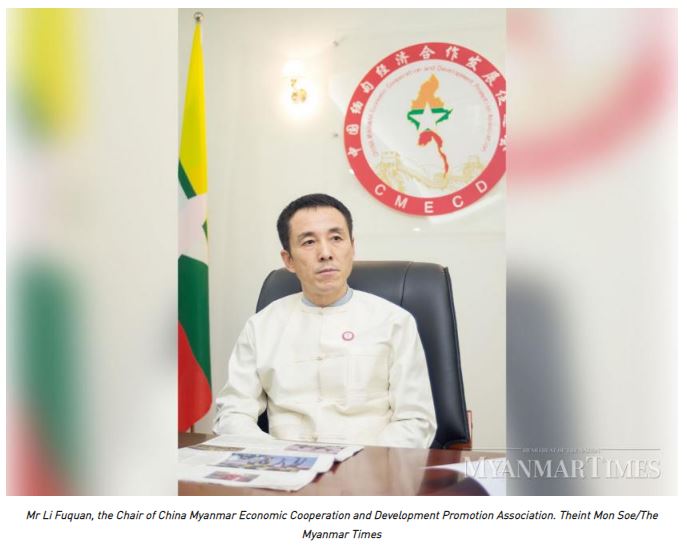Myanmar on the radar as investors shift funds from China
Myanmar is well-positioned to benefit from the flight of capital to the Asean region as the trade war between China and the US plays out, officials said.
‘’Myanmar is one of the targeted countries for businesses planning to shift out of China to avoid the fallout from the trade war,” Li Fuquan, the Chair of China Myanmar Economic Cooperation and Development Promotion Association, told The Myanmar Times.
However, he warned that Myanmar faces stiff competition from other Asean hotspots like Vietnam and Cambodia. “Other regional countries are also attractive for investors. So, Myanmar needs to up its game to if it wants to draw businesses to its shores,” Mr Li said.
He said businesses in China now expect the trade war between the two superpowers to be a long and drawn out one and many are making plans to move their factories and headquarters into the region to avoid US tariffs and stay competitive.
U Phyo Min Thein, Chief Minister of Yangon Region Government and chair of Yangon Region Investment Committee, said in June that “many foreign investors have already shown interest in the city because of the trade war.
U Aung Naing Oo, the Permanent Secretary of the Ministry of Investment and Foreign Economic Relations, echoed the chief minister’s sentiments. He said businesses in China are considering moving to four main countries: Vietnam, Cambodia, Indonesia and Myanmar.
“Many Chinese business delegations have been continuously coming to Myanmar to explore the business environment. We are on their radar for potential expansion and as an alternative destination for manufacturing and other services,” he said.
Chinese investors want to manufacture and export goods to the US from countries like Myanmar to avoid incurring tariff expenses imposed by the US on China-made products as a result of the trade war. “So, the government must present a good business and political case to lure them over,” U Maung Maung Lay, vice chair of the Union of Myanmar Federation of Chambers of Commerce and Industry said:
While manufacturers considering Myanmar are keen to operate out of Thilawa Special Economic Zone in Yangon, which is well-equipped with the required infrastructure, it could take some doing convincing them to invest elsewhere in the country.
 Yangon stands to gain from higher Chinese FDI. Nyan Zay Htet/The Myanmar Times
Yangon stands to gain from higher Chinese FDI. Nyan Zay Htet/The Myanmar Times
Power shortage
That’s because infrastructure, particularly for power, is still lacking. Just recently, a Chinese aluminum manufacturing company withdrew plans to shift its factory to Myanmar after an initial reconnaissance revealed a shortage of power needed for it to conduct operations, Mr Li said.”Myanmar needs to solve its power gap to attract more foreign direct investments (FDI),” he said.
According to the World Bank’s report launched last week, power consumption will grow at an average annual rate of 11 pc until 2030, with peak demand expected to reach 8.6 gigawatts(GW) by 2025 and 12.6 GW by 2030, a significant increase from the current level of 3.6 GW.
“To cater to this demand, overall investment requirements are estimated to be around US $2billion per year, which is double historic levels. By 2025, 5 GW of new generation capacity needs to be added, equivalent to roughly three times what was built over the same period in the past,” the report said.
U Aye Tun, vice chair of Myanmar Industrial Association, reckons that Myanmar will lose out on a substantial share of FDI because of its inability to meet demand for power and other basic infrastructure requirements.
“The idea behind businesses moving out of China to Myanmar is so that they can produce and export made in Myanmar goods to the US. But they may well face more challenges by moving to Myanmar due to the lack of infrastructure. My view is that our country will not be a priority for those businesses,” he told the Myanmar Times.
Still a chance
But U Aung Naing Oo argued that Myanmar still stands a chance in drawing more FDI. “We are hearing some investors say that Myanmar is a greenfield market with more growth potential than our neighbours. So we are taking efforts to lure them to Myanmar,” he said.
Daw Thet Thet Khine, the Member of Parliament, Pyithu Hluttaw, reckons that Myanmar stands a fair chance to gain from the impact of the trade war. “Can we attract the investors? I think that it depends on us. The government has to create an attractive business environment and help to make doing business in the country easier,” she said.
China is among one of the largest investors in Myanmar, accounting for a quarter of FDI, or around US$ 20 billion worth, according to the April statistics provided by the Directorate of Investment and Company Administration (DICA).
During the six month transition period from April 2018 to September 2018, China invested more than US$ 300 million in Myanmar. During the first seven months of the current fiscal year, it invested another US$ 300 million in the country, implying that Chinese FDI in Myanmar has been stable.
As a whole though, although FDI commitments began to pick up slightly in the first-half of the current fiscal year compared with the same period last year, it remains at just a third of annual FDI commitments totaling US$5.8 billion in 2017-18, according to DICA.
Source: https://www.mmtimes.com/news/myanmar-radar-investors-shift-funds-china.html


 English
English




